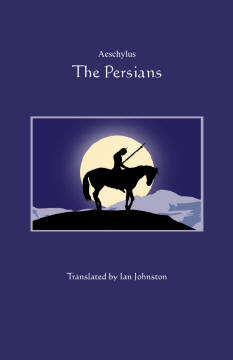Questions? Call us
toll free:
1-800-856-3060
Classics/ Greek Drama ISBN:
978-1-935238-57-7
USD $8.95
Translated by Ian Johnston
Aeschylus (c.525 BC to c.456 BC) was one of the three great Greek tragic dramatists whose works have survived. Of his many plays, seven still remain. Aeschylus may have fought against the Persians at Marathon (490 BC), and he did so again at Salamis (480 BC). According to tradition, he died from being hit with a tortoise dropped by an eagle. After his death, the Athenians, as a mark of respect, permitted his works to be restaged in their annual competitions.
Aeschylus’ play The Persians was first produced in 472 BC. It is the oldest surviving play in our traditions.
Persian armies launched two famous invasions against the Greek main-land. The first (in 490 BC) was sponsored by Darius, king of Persia. It ended at the Battle of Marathon close to Athens with a Greek victory, in which the Athenians played the major role. The second Persian expedition (in 480 BC) was sponsored and led by Xerxes, son of Darius, who had succeeded his father as king, after Darius’ death.
A major reason for these invasions was to punish Athens for its assistance to Greek cities in Asia Minor and on some of the islands close by, an important part of the Persians’ sphere of influence. These cities had close ethnic links to the Greeks, especially to the Athenians, and resented Persian domination. Hence, they were a source of conflict within the Persian Empire.
We have made this book available to you for previewing. Clicking on the front cover of the book image to the left will open this book up into a flipbook format which can be read online.
You must have Adobe Flash to open this file. If you do not have Adobe Flash on your computer, you download it free from Adobe here.
At Richer Resources, we are dedicated to the creation of high quality books, art and other media intended to enrich the lives of individuals of all ages.
As an independent publisher, we are bound by a sense of integrity and quality to produce products which enhance the lives and vision of individuals everywhere.
Sign up to receive notice of free eBooks, new releases and special subscriber-only offers.
(You can unsubscribe at any time)
